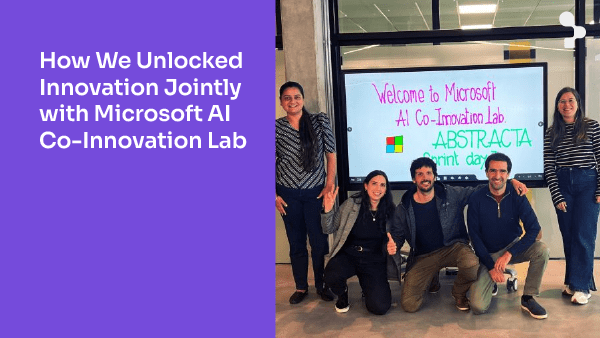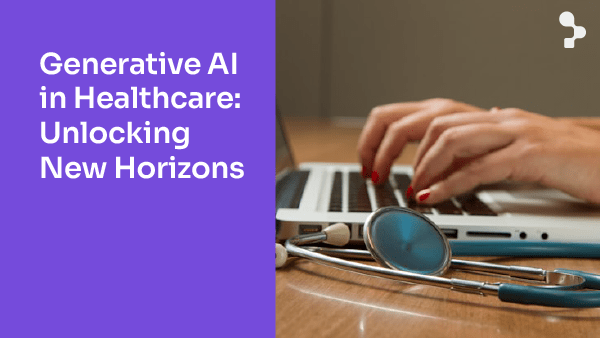See how Generative AI in Legal transforms the legal sector with advanced analysis and cost reduction. Partner with Abstracta and start a new journey.


Generative AI (GenAI) is transforming the legal landscape, offering unprecedented efficiency and accuracy. This technology is not just a tool but a catalyst for change in the legal landscape, enabling legal professionals to streamline their workflows and enhance their decision-making processes.
GenAI sets new standards in the legal industry; it improves productivity and the delivery of legal services. Through what means? By automating routine tasks and delivering deep insights through advanced data analysis. Harnessing vast data sources and sophisticated algorithms, GenAI produces and analyzes content based on user prompts, driving innovative outcomes.
Let’s explore how this cutting-edge technology is reshaping the legal profession and what it means for the future of law.
Interested in exploring how AI copilots or assistants can revolutionize your operations in law? Discover our AI Software Development solutions. Our global client reviews on Clutch speak for themselves.
AI and Law: What is Generative AI for Legal?


Generative AI refers to artificial intelligence systems that can create new content, such as text, images, or even legal documents.
In the legal field, this technology can draft contracts, analyze case law, and even assist in predicting legal outcomes. By automating these tasks, generative AI allows legal professionals to focus on more complex and strategic work.
Generative AI tools are designed to assist legal professionals in various aspects of their work. For instance, these AI tools can help in drafting legal briefs, conducting legal research, and even in the review of legal documents. The use of Gen AI in legal practices not only enhances efficiency but also boosts higher-quality work by reducing the chances of human error.
Additionally, it is possible to integrate generative AI tools with other large language models to provide more comprehensive legal assistance. These tools can analyze vast amounts of data points from previous legal cases, statutes, and regulations to provide accurate and relevant information.
Don’t miss this article: New AI Chatbot: How We Built Our Own ChatGPT
Key Applications of Generative AI for Legal


GenAI is transforming the legal sector by streamlining processes and enhancing efficiency. Here are some prominent use cases:
- Contract Review: It can quickly analyze extensive contracts, identify problematic clauses, and suggest improvements. Not only does this speed up the review process but it also prevents critical issues from being overlooked.
- Document Generation: Lawyers can save significant time using Generative AI to draft standard legal documents, such as a non-disclosure agreement, a service contract, or a legal brief. This automation allows legal professionals to focus on more complex and customized legal matters.
- Legal Research: AI aids in legal research by exploring vast databases and case laws to find relevant precedents. This capability enhances the thoroughness and speed of legal research, providing lawyers with the necessary information to build strong cases. GenAI tools enable lawyers to conduct legal research efficiently by analyzing large datasets, enhancing their strategic capabilities, and providing greater value to their clients.
- Document Analysis: Advanced AI tools assist legal professionals in managing and processing large volumes of documents efficiently. These tools can analyze and summarize documents quickly, enhancing accuracy and streamlining complex tasks like contract review and legal drafting.
- Litigation Outcome Prediction: Utilizing historical data, GenAI can predict potential verdicts, helping legal teams strategize effectively. By analyzing past case outcomes, it provides insights that may guide legal strategies and improve the likelihood of favorable results.
- Client Interaction: Generative AI can assist in client interaction by providing quick responses to common legal queries. This improves client satisfaction and allows lawyers to manage their workload more efficiently.
- E-Discovery: During the discovery phase of litigation, GenAI can process vast amounts of electronic data to identify relevant information. This speeds up the discovery process and ensures that no critical documents are missed.
- Due Diligence: In mergers and acquisitions, GenAI can perform due diligence by analyzing financial records, contracts, and other critical documents. This reduces the time and effort required to assess the viability and risks associated with a transaction.
Now that we have explored how GenAI is applied in the legal field, let’s look at the specific benefits this technology can offer.
Benefits of Generative AI in the Legal Field


Generative AI offers numerous benefits to the legal field, enhancing productivity and accuracy. Next, we share some key advantages:
Increased Efficiency
Generative AI handles repetitive tasks, allowing lawyers to focus on strategic and complex work. By automating routine processes, legal professionals can allocate their time to tasks that require human judgment and expertise.
Enhanced Accuracy
By reducing human error, GenAI improves the precision of legal documents and research. Automated systems boost legal texts to be consistent and comply with the latest legal standards and regulations.
Cost Reduction
Automating routine processes can significantly cut down operational costs. Law firms reduce the time spent on administrative tasks, thereby lowering expenses and increasing profitability.
Better Decision Making
Access to comprehensive data analysis enables more informed and strategic legal decisions. GenAI can analyze large volumes of data quickly, providing insights that help lawyers make better decisions based on empirical evidence.
Scalability
Generative AI systems can handle a large volume of work without compromising quality. This scalability is particularly beneficial for law firms dealing with high caseloads or large volumes of documents.
Enhanced Client Service
Generative AI can improve client service by providing timely and accurate information. Automated systems can manage client interactions more efficiently, leading to higher client satisfaction and better client retention.
On the whole, by integrating generative AI into their practices, legal professionals can achieve higher efficiency, greater accuracy, and improved client service, positioning themselves at the forefront of innovation in the legal industry.
Real-World Examples of Generative AI for Legal


Having covered the various applications and benefits of GenAI in the legal field, it’s time to examine some real-world examples to gain a deeper understanding.
In this section, we’ll summarize two of Abstracta’s case studies: enhancing legal search efficiency for a law firm and streamlining client onboarding for a financial institution with automated reports.
Case Study #1: Boosting Legal Research


Our team revolutionized a law firm’s document search process by integrating generative AI, enabling legal professionals to efficiently access and create new documents from their extensive historical archives, significantly reducing search time and minimizing revenue loss.
Meet Our Client
A renowned law firm, our client faced the challenge of managing an overwhelming volume of legal documents. Their professionals needed to quickly reference these documents for ongoing projects and cases, but the existing search process was inefficient and time-consuming.
Understanding Challenges
Managing a repository of hundreds of thousands of legal documents, our client was spending an average of 4 hours per week searching for information, leading to a potential revenue loss of up to 10% revenue loss due to inefficient information retrieval processes.
They needed a solution to streamline document search and retrieval processes while maintaining security and confidentiality.
Solutions and Activities
We developed a cutting-edge solution leveraging generative AI that empowered our client, a prominent law firm, to rapidly search through hundreds of documents. By simply asking questions through an intuitive chat interface, the firm can now retrieve critical information within seconds, significantly streamlining its legal research process.
We employed Retrieval Augmented Generation (RAG) technology, combining it with a vector database to transform the document search process. Our approach did not require model training, allowing for immediate benefits. We enabled security and confidentiality by restricting access based on each professional’s level.
Results and Achievements
Our collaboration with the law firm led to significant advancements in document search efficiency. Key accomplishments include:
✅ Reduced time spent on document searches by implementing AI-driven solutions, allowing professionals to focus more on their cases.
✅ Minimized revenue loss by optimizing information retrieval, leading to increased productivity and efficiency.
✅ Enhanced document security and confidentiality by restricting access based on user levels, allowing sensitive information to remain protected.
Our partnership fostered innovation and efficiency, significantly improving their operational capabilities and enhancing their competitive edge in the legal industry.
Case Study #2: Streamlining Onboarding Process


We enhanced the legal onboarding process for financial institutions using generative AI, enabling the automated generation of initial legal reports for client onboarding. This resulted in quicker approvals, reduced back-and-forth, and a smoother client experience.
Meet Our Client
Our client is a prominent financial institution offering comprehensive services to businesses. They facilitate various banking operations, ensuring robust support and secure financial transactions for their corporate clients.
Understanding Challenges
Our client faced significant bottlenecks during the onboarding process due to the manual validation of corporate contracts. The legal department, responsible for generating and validating these contracts, often became overwhelmed, leading to delays and reduced client satisfaction.
This manual process slowed down the approval times and increased the back-and-forth communication between the bank and new corporate clients.
The client approached us seeking a solution to streamline this process, improve client experience, and expedite the onboarding of new clients.
Solutions and Activities
Our team harnessed the power of Generative AI to automate the initial generation of legal reports, seamlessly integrating this capability into the client’s onboarding system. This provided clients with a prompt preliminary legal report upon requesting to open a new account, streamlining the final report creation by the legal department.
By minimizing manual intervention, we reduced the legal team’s workload while allowing for accurate and secure data processing. The automated system enabled easy updates and adjustments to adapt to regulatory changes and client requirements.
Results and Achievements
Our collaboration led to significant improvements in the client onboarding process, delivering numerous benefits:
✅ Accelerated client approval times, reducing the waiting period from weeks to days.
✅ Decreased the workload on the legal team, enabling them to focus on more complex tasks.
✅ Enhanced client experience by minimizing delays and reducing back-and-forth communication.
✅ Lowered operational costs associated with the onboarding process by implementing a cost-effective automated solution.
✅ Increased sales opportunities, as new clients could be onboarded and serviced more swiftly.
Our partnership fostered efficiency, innovation, and a client-centric approach, empowering the financial institution to strengthen its market position and improve client relationships.
Need support for increasing your productivity? We build AI-driven solutions specifically tailored to your needs. Explore our case studies and contact us.
Key Considerations for Implementing Generative AI


When implementing generative AI, there are several key considerations to keep in mind. First, ensure that the AI system is secure and compliant with regulations. Second, prioritize transparency and explainability. Third, continuously monitor and test the AI system to identify and address any issues.
By following these steps, you can ensure a successful implementation.
Every AI tool must be designed to comply with relevant laws and regulations. This includes ensuring that AI systems are transparent and explainable and providing insights into the decision-making process of AI models. By addressing these concerns, we can validate that AI systems are both effective and ethical.
When it comes to developing and implementing AI tools in the legal field, taking into account ethical considerations is paramount. This includes verifying if AI systems are free from bias and discrimination and providing accurate and unbiased legal assistance.
How We Can Help You
With over 16 years of experience and a global presence, Abstracta is a leading technology solutions company specializing in AI software development and end-to-end software testing services.
We believe that actively bonding ties propels us further and helps us enhance our clients’ software. That’s why we’ve forged robust partnerships with industry leaders like Microsoft, Datadog, Tricentis, and Perforce, empowering us to incorporate cutting-edge technologies.
We craft strategies meticulously tailored to your unique needs and goals.
Visit our AI Software Development page and contact us to discuss how we can help you grow your business.


Follow us on Linkedin & X to be part of our community!
Recommended for You
Artificial Intelligence Business Ideas: Bring your Projects to Life
Generative AI for Dummies: A Comprehensive Guide for Beginners and Beyond
How We Unlocked Innovation Jointly with Microsoft AI Co-Innovation Lab
Related Posts
How We Unlocked Innovation Jointly with Microsoft AI Co-Innovation Lab
Dive into our transformative journey with Microsoft AI Co-Innovation Lab! In this partnership with Microsoft, we have set new standards for understanding systems on the path of enhancing software quality and beyond. By Natalie Rodgers Artificial Intelligence (AI) has the potential to transform businesses in…
Generative AI in Healthcare: Unlocking New Horizons
Explore the power of Generative AI in the healthcare industry, its transformative applications, challenges, and future potential.
Leave a Reply Cancel reply
Search
Contents








